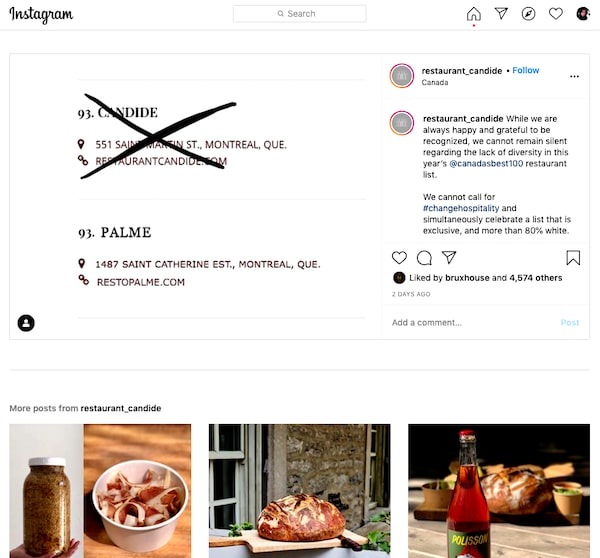
Candide’s chef and co-owner ceded the restaurant’s 93rd spot on the list to Palme.
Restaurant Candide in Montreal threw down a gauntlet this week, challenging Canada’s 100 Best Restaurants list, and Canadian food media, to expand its focus beyond white chefs and restaurateurs. John Winter Russell, Candide’s chef and co-owner, ceded the restaurant’s 93rd spot on the list to Palme, a Caribbean restaurant in Montreal. David McMillan quickly followed suit, offering Joe Beef’s third-place to Bistro Nolah in Montreal’s West End.
Russell is the first person to publicly acknowledge the racial homogeneity of Canada’s 100 Best Restaurants (its gender disparity has long been a contentious point). Candide’s place on the list is a source of conflict for him. On social media, his mostly white friends are hailing him as an ally, and there’s no question the exposure from being on the list benefits the restaurant economically. “If the restaurant was full every day and I didn’t have to worry about selling it to people, I wouldn’t need the press,” he says.
Jacob Richler, editor-in-chief and co-owner of the publication, is forthright in his response. “To cede his place to someone else is not something we can execute; it’s not compatible with the way we put the list together.” KPMG is the official auditor and compiles anonymous results from judges.
It’s not the first time the list has courted controversy. Since its beginning in 2014, women in the industry have pointed out the list’s gender disparity. Women represent fewer than 10 per cent of the chefs this year. Almost 100,000 Canadian women identify as cooks according to the 2016 Stats Can census report, but it’s hard to extrapolate how many run kitchens. Comparable figures from the U.S. Bureau of Labor reveal women lead 20 per cent of restaurant kitchens.

Lee-Anne Millaire Lafleur, who owns Palme with her husband, chef Ralph Alerte, had no prior notice of Russell's actions.Robby Reis/Handout
Richler is firm in his belief that the list reflects kitchen demographics, and wonders if part of the problem lies with chefs who hire and train their own kind. “I don’t create the restaurant industry, I merely report on what’s there,” he says. Russell says his restaurant doesn’t follow the pattern: “There is no hierarchy. We are three men and two women; one of the cooks is Black.” But a real barrier to progress on diversity and equity in general is the difficulty of getting an impartial snapshot of the industry, and one restaurant is hardly representative.
Lee-Anne Millaire Lafleur, who owns Palme with her husband, chef Ralph Alerte, had no prior notice of Russell's actions. They found themselves in the spotlight with zero consultation. "I'm grateful for the attention, but the place on the list is still his," she says. She'd like future lists to explore many cultures and to reflect the food scene in Canadian cities accurately. "We want people to discover the different histories, cuisines and flavours of the Caribbean," she says.
Lafleur describes herself as a visible minority and Ralph is of Haitian descent; both are familiar with isolation. Alerte has few Black colleagues and is acutely aware of how important it is for young Black cooks to see themselves in him. Lafleur refers to the local chefs on the list as the “club.” When asked if they are ever invited to participate in local food events, her response is, “no.” In the three years since opening, they have been invited to one local food event, Martinique Gourmande.
Prior to the controversy, Richler had put out a call for new judges. In 2019, concern about conflicts of interest were raised – some of the judges had restaurants on the list. The solution to the problem was to make the judges anonymous. Richler is adamant restaurants and judges don’t mix, but the optics are questionable. And there’s no Plan B if the call for judges doesn’t yield the desired results. “I don’t think that’s an eventuality I have to consider,” Richler says. “I’m optimistic we will get more.”
It’s hard to know if the current challenge will result in real change. “We have traditionally focused on high-end, high-price-point dining and we can easily broaden the scope to be more inclusive,” says Richler. But questions still remain. Do all parties have the stamina to shift the dominant culture? What purpose do lists like Canada’s 100 Best Restaurants serve, and is their time over? When Lafleur looks to the future, she says, “I hope my three young sons grow up in a world where exclusive clubs are thought of as nothing other than ridiculous.”
Plan your weekend with our Good Taste newsletter, offering wine advice and reviews, recipes, restaurant news and more. Sign up today.